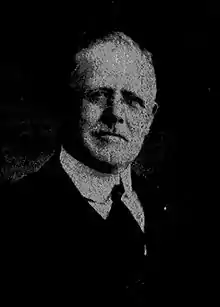John Merle Coulter
John Merle Coulter, Ph. D. (November 20, 1851 – December 23, 1928) was an American botanist and educator.[1][2]: 57–9 In his career in education administration, Coulter is notable for serving as the president of Indiana University and Lake Forest College and the head of the Department of Botany at the University of Chicago.
John Merle Coulter | |
|---|---|
 | |
| 3rd President of the Lake Forest College | |
| In office 1893–1896 | |
| Preceded by | William C. Roberts |
| Succeeded by | James Gore King McClure |
| 8th President of Indiana University | |
| In office 1891–1893 | |
| Preceded by | David Starr Jordan |
| Succeeded by | Joseph Swain |
| Personal details | |
| Born | November 20, 1851 Ningbo, China |
| Died | December 23, 1928 (aged 77) Yonkers, New York, US |
| Resting place | Warsaw, Indiana, US |
| Nationality | American |
| Alma mater | |
| Scientific career | |
| Fields | Botany |
| Institutions | |
| Doctoral students | |
| Author abbrev. (botany) | J.M.Coult. |
Early life and education
John Merle Coulter was born in Ningpo, China to missionary parents Caroline Elvira Crowe and Moses Stanley Coulter. His brother was the botanist Stanley Coulter. He graduated from Hanover College in Indiana receiving the degree A.B. in 1870, followed by an A.M. in 1873 and Ph.D. in 1883 from the Indiana University.[3]: 471 Indiana University conferred a pro merito Ph.D. to Coulter in 1884 while he was serving as Professor of Botany at Wabash College.[3]: 472 He married Georgie M. Gaylord of Delphi, Indiana on January 1, 1874.[3]: 474
Career
John Merle Coulter held the following positions:
- 1871–1879 Professor of Natural Sciences at Hanover College
- 1872–1875 Botanist to the United States Geological Survey in the Rocky Mountains[3]
- 1879–1891 Professor of Botany at Wabash College
- 1891–1893 President and Professor of Botany of Indiana University, succeeding David Starr Jordan as president
- 1893–1896 President of Lake Forest College
- 1896–1925 Professor and head of the department of Botany at the University of Chicago.
- 1925–1928 Dean and adviser of the Boyce Thompson Institute for Plant Research in Yonkers, New York, a position he held until his death.
Memberships in scientific societies
In 1901, Coulter was the general secretary of the American Association for the Advancement of Science and in 1918 served as the Association's president. From 1897 to 1898, he was the president of the Botanical Society of America.[3]: 472
Survival of the sinking of Republic
In 1909, Coulter and his wife, along with their children Grace and Merle, survived the sinking of the White Star liner Republic in which six were killed.
Later life
While employed at the Boyce Thompson Institute, Coulter died from heart disease at his home in Yonkers, New York, on December 23, 1928 at the age of 77.[4]
Notable works
John Merle Coulter's published works include:
- Synopsis of the Flora of Colorado (1874), with Thomas Porter and Ferdinand Vandeveer Hayden
- Manual of Rocky Mountain Botany (1885; revised, 1909)
- Manual of Texan Botany (1892–93)
- Plant Relations (1899; third revision, 1910)
- Plant Structures (1899; second edition, 1904)
- Morphology of Spermatophytes (1901)
- Morphology of Angiosperms (1903), with C. J. Chamberlain
- Plant Studies (1902; revised 1905)
- A Text-Book of Botany for Colleges and Universities(two volumes, 1910–11)
- Elementary Studies in Botany (1913)
- Plant Breeding (1914)
- Evolution, Heredity and Eugenics (1916)
- Religion and Science (1923)
In 1875, Coulter founded the Botanical Gazette and thereafter continued to be its editor.[3]: 474
Legacy and contributions
References
- "Coulter, John Merle". The International Who's Who in the World. 1912. p. 319 – via Google Books.
- Humphrey, Harry Baker. Makers of American Botany. Ronald Press Company. LCCN 61-18435.
- Myers, Burton Dorr (1951). Officers of Indiana University 1820–1950. Indiana University.
- "Prof. Coulter Dies; Dean of Botanists: Was a Member of College Faculties for More Than Half-Century. Admirers Planned Honor; He Had Been Scientific Adviser of Thompson Institute for Plant Research Recently". New York Times. December 24, 1928. p. 8.
Dr. John Merle Coulter, who has been called the dean of American botanists, died yesterday at his home in Yonkers. His age was 77... Burial will be at Warsaw, Ind.
Alternate Link via ProQuest. - Smith, Stephanie & Mark, Steve (2009). "The Historical Roots of the Nature Conservancy in the Northwest Indiana/Chicagoland Region: From Science to Preservation". The South Shore Journal. 3: 1–10. Archived from the original on 2016-01-01. Retrieved 2015-11-22.
- Smith, Stephanie & Mark, Steve (2006). "Alice Gray, Dorothy Buell, and Naomi Svihla: Preservationists of Ogden Dunes". The South Shore Journal. 1: 15–21. Archived from the original on 2012-09-13. Retrieved 2012-06-11.
- Smith, Stephanie & Mark, Steve (2007). "The cultural impact of a museum in a small community: The Hour Glass of Ogden Dunes". The South Shore Journal. 2: 16–28. Archived from the original on 2012-11-30. Retrieved 2012-06-11.
- International Plant Names Index. J.M.Coult.
External links
- IMA
- Living Rocks of New Mexico
- Works by John Merle Coulter at Project Gutenberg
- Works by or about John Merle Coulter at Internet Archive
- Indiana University President's Office records, 1891–1893
- National Academy of Sciences Biographical Memoir
- Guide to the John Merle Coulter Papers 1845-1929 at the University of Chicago Special Collections Research Center